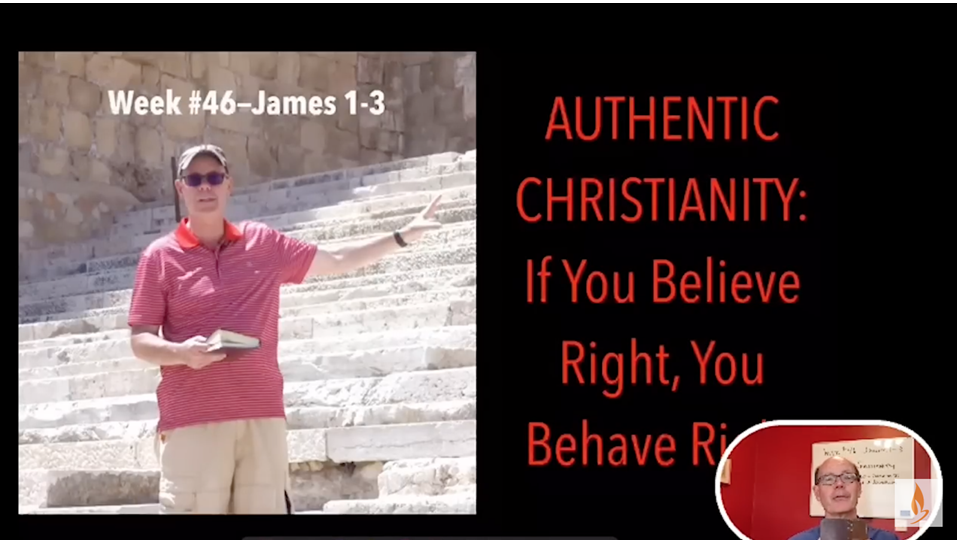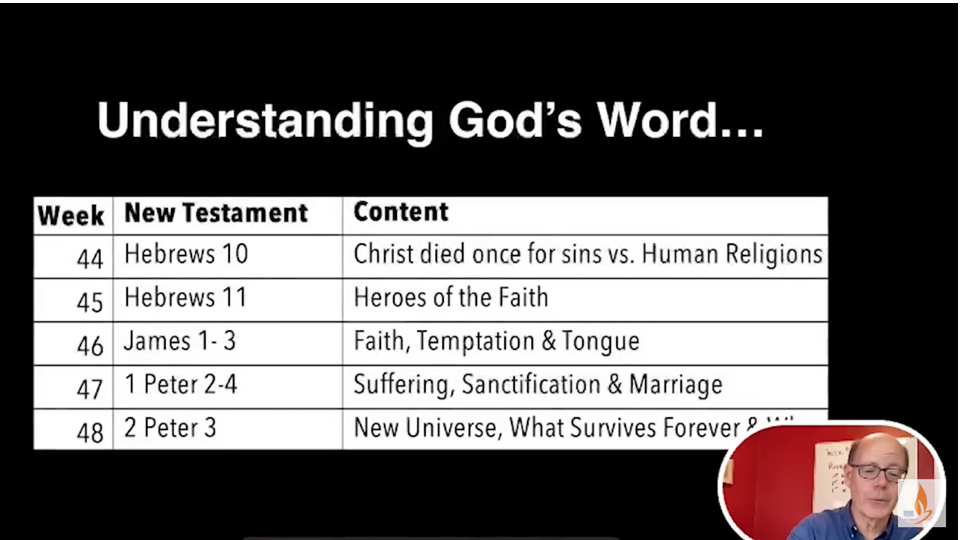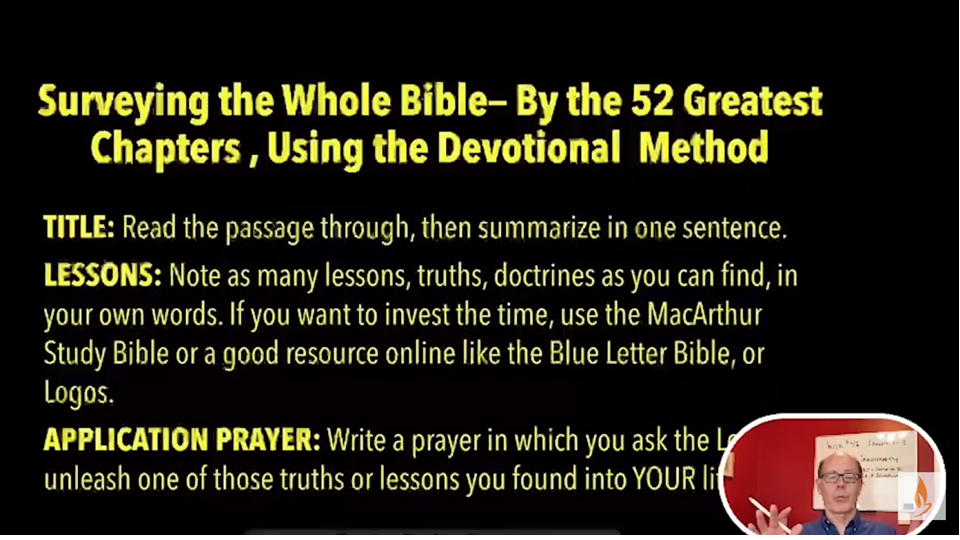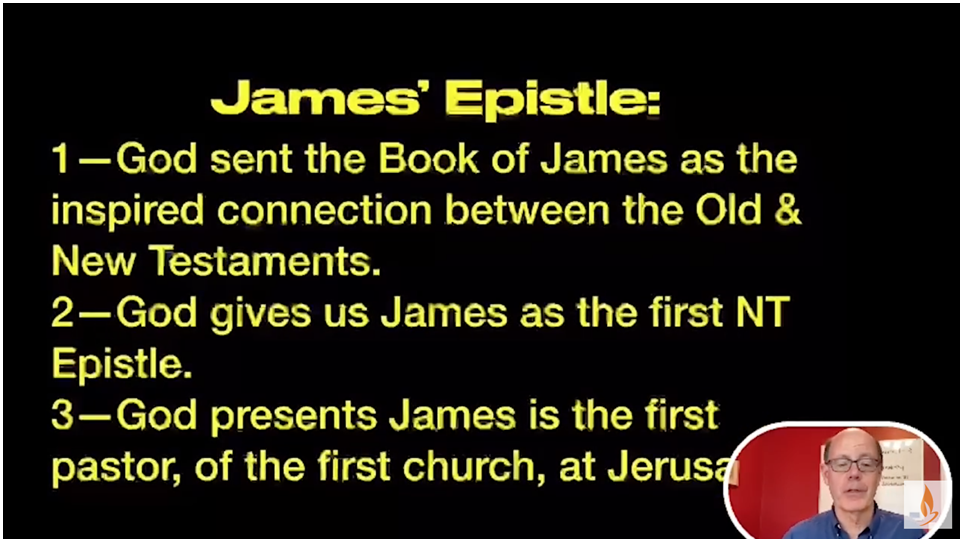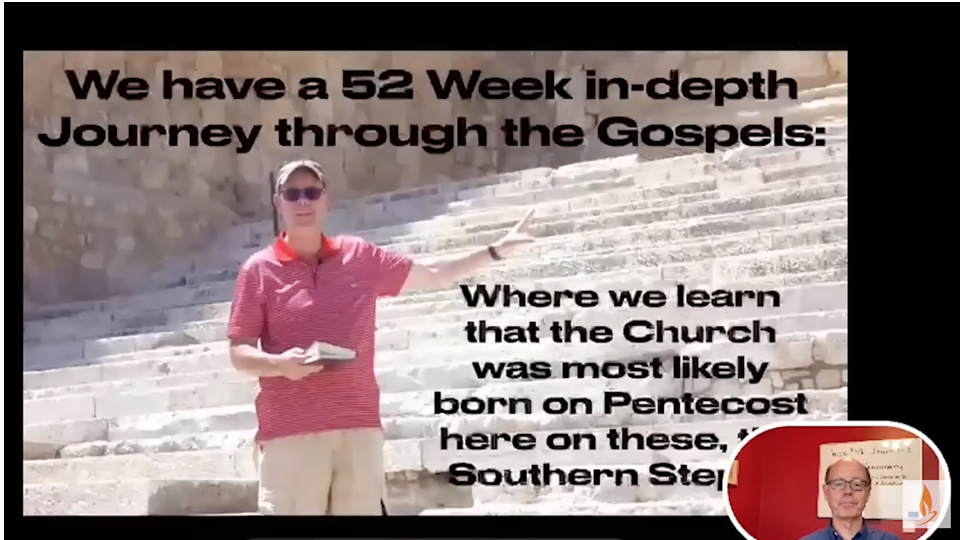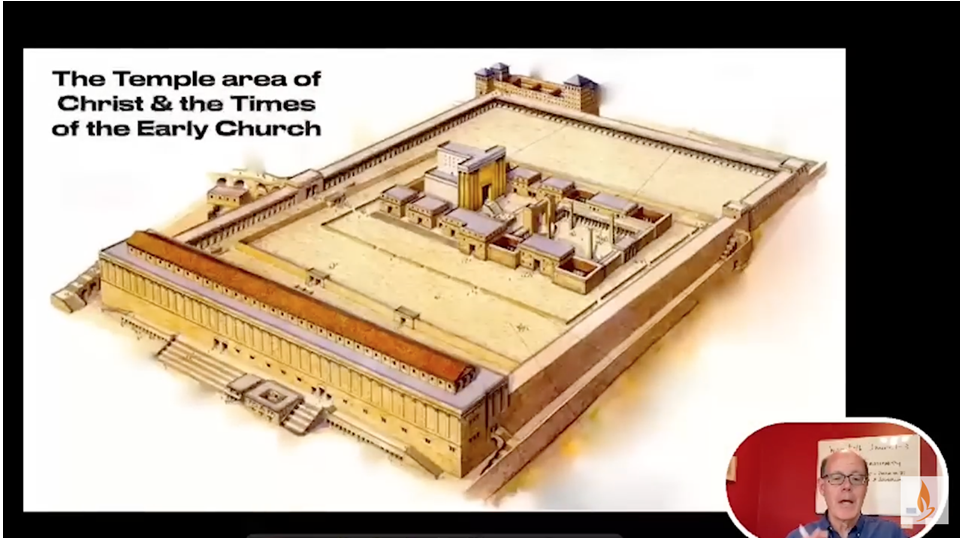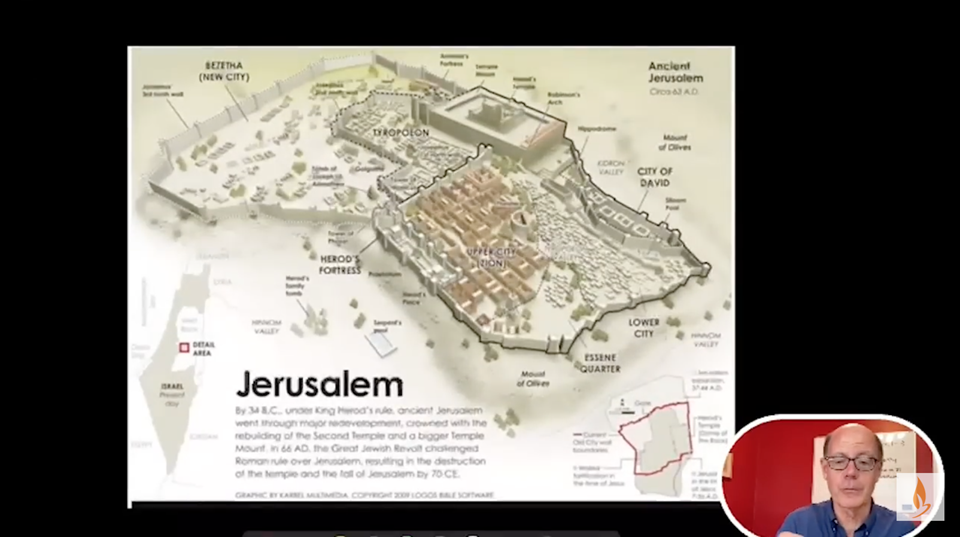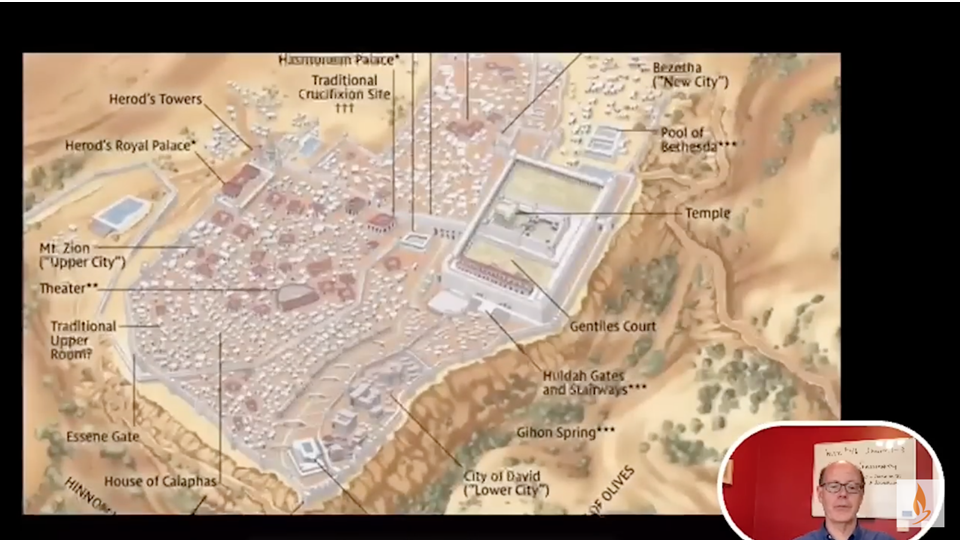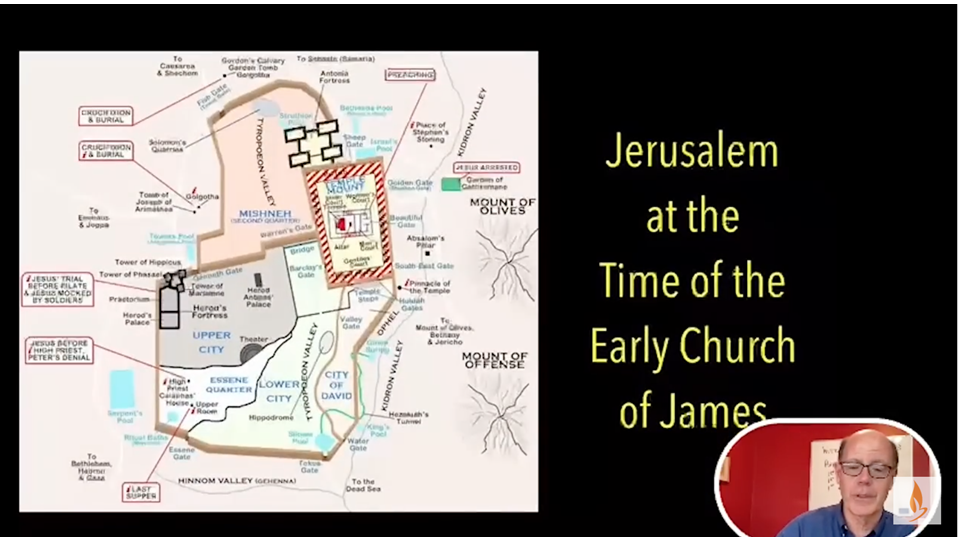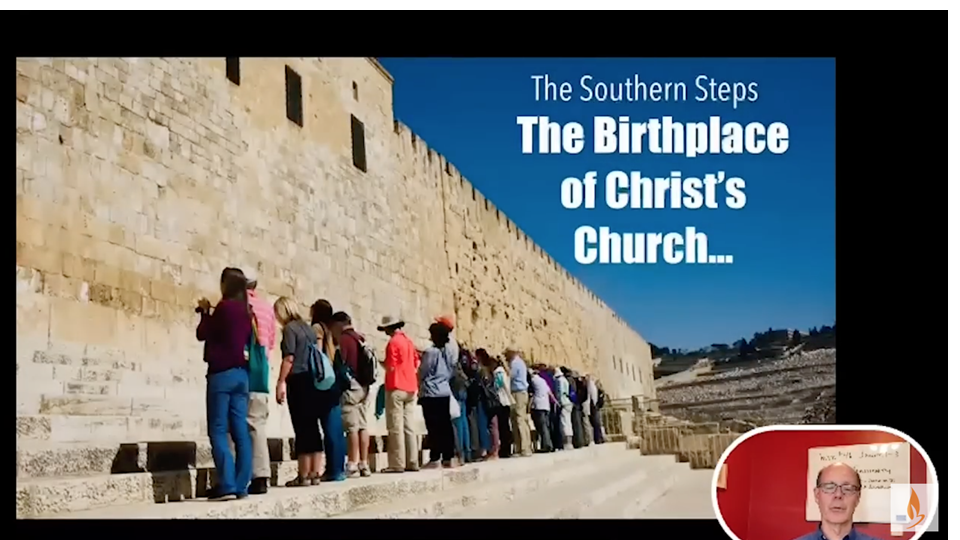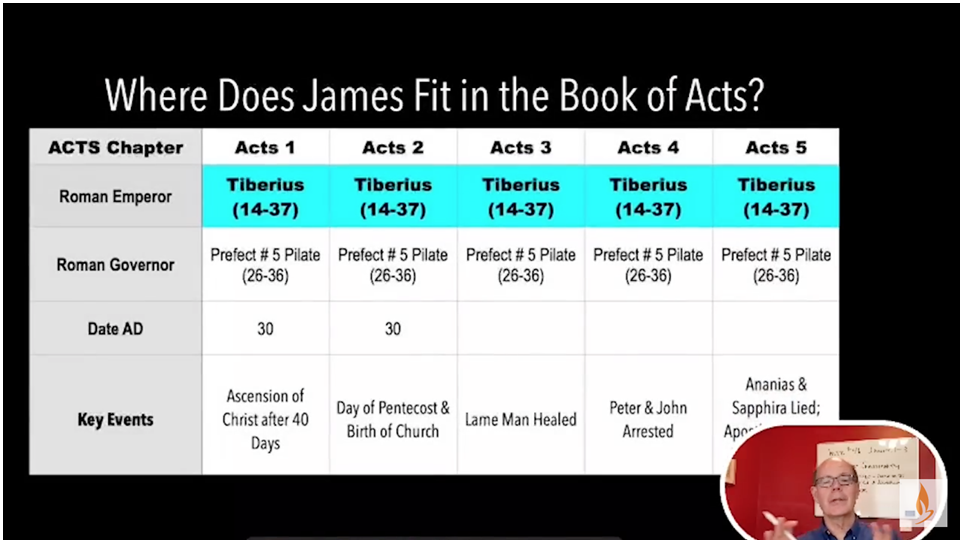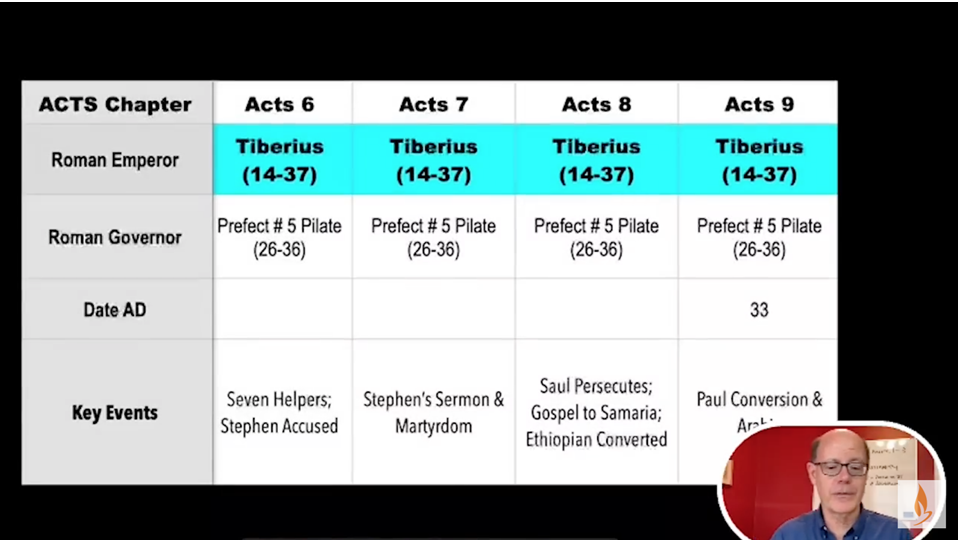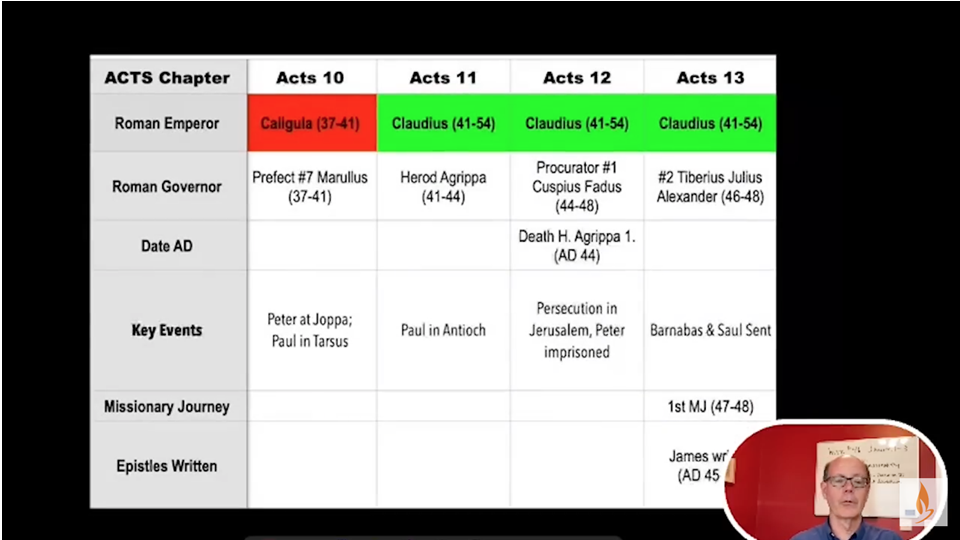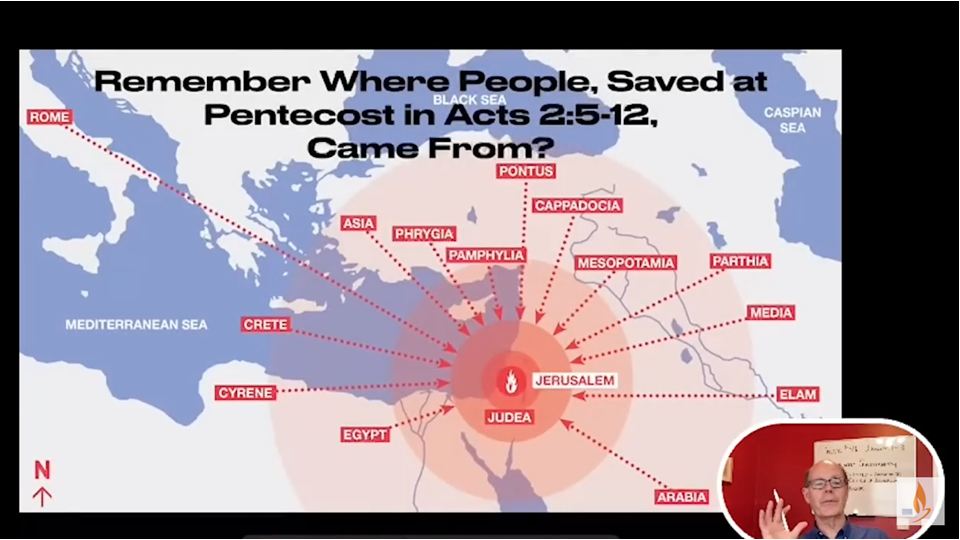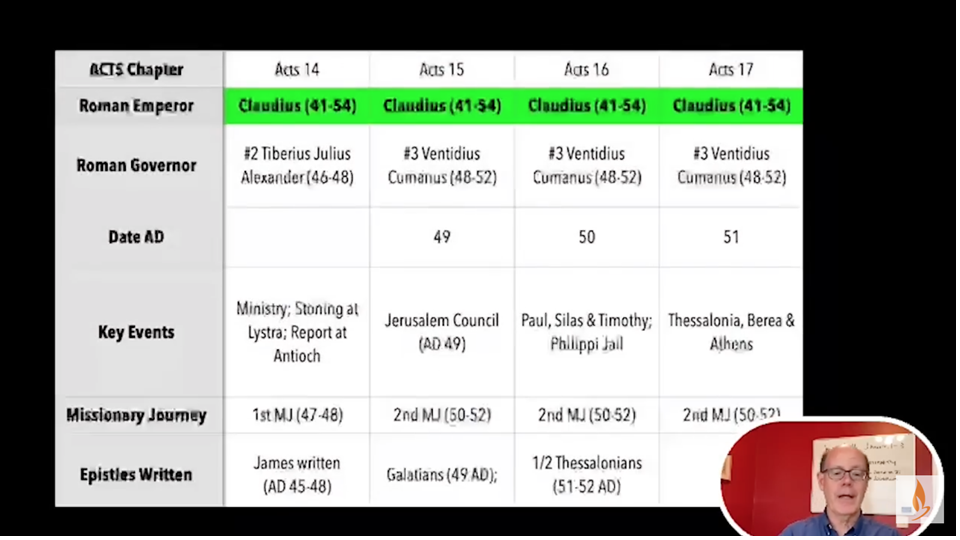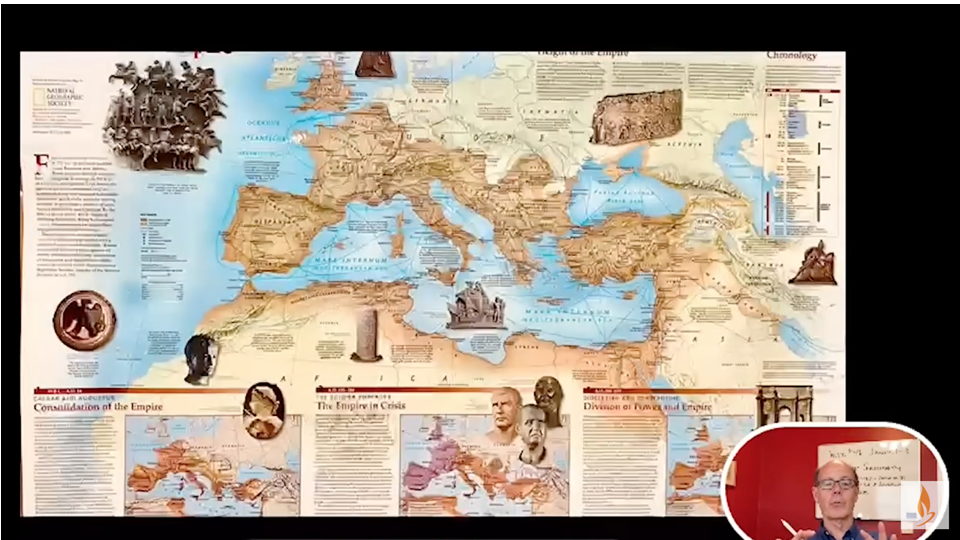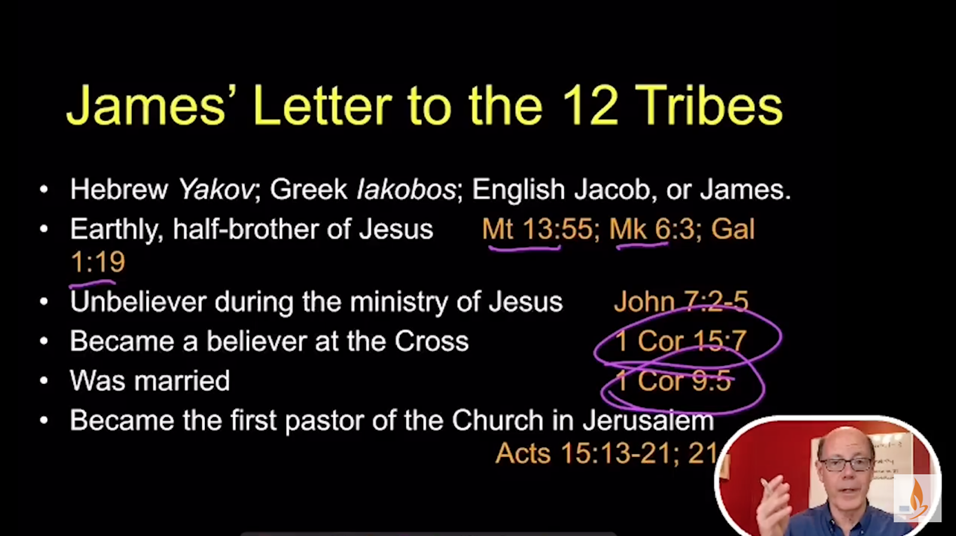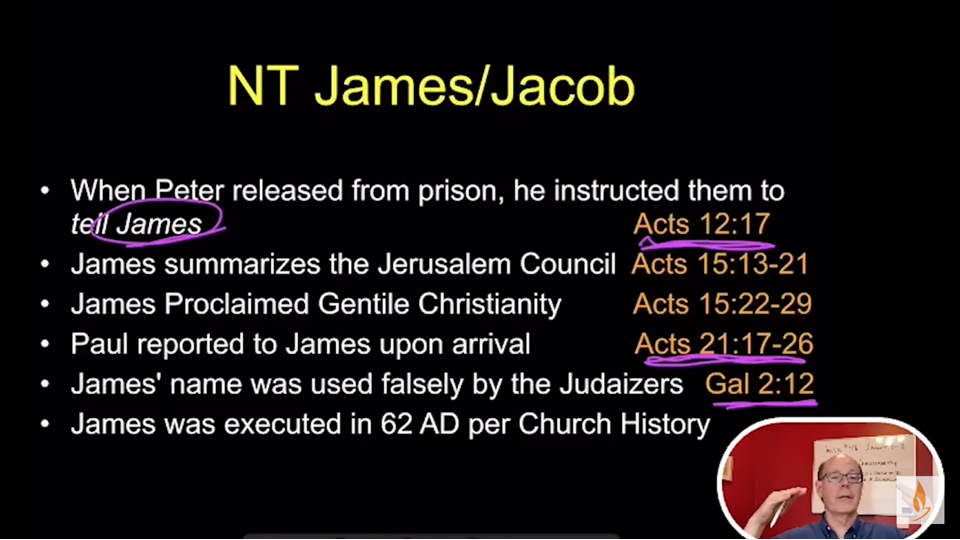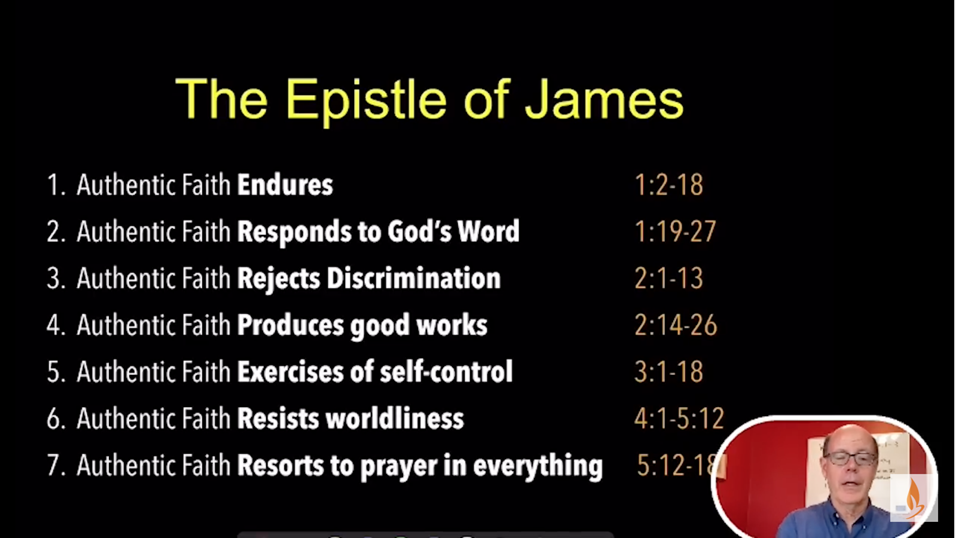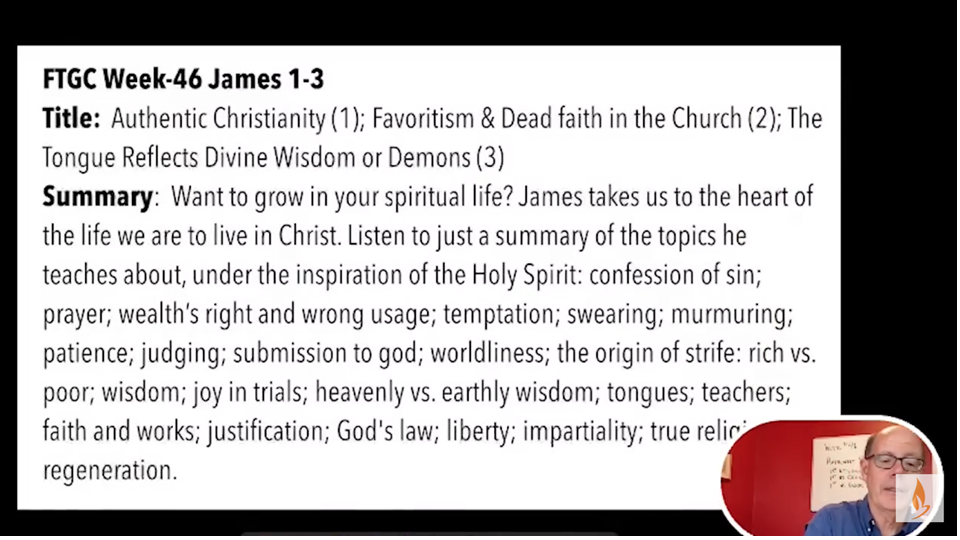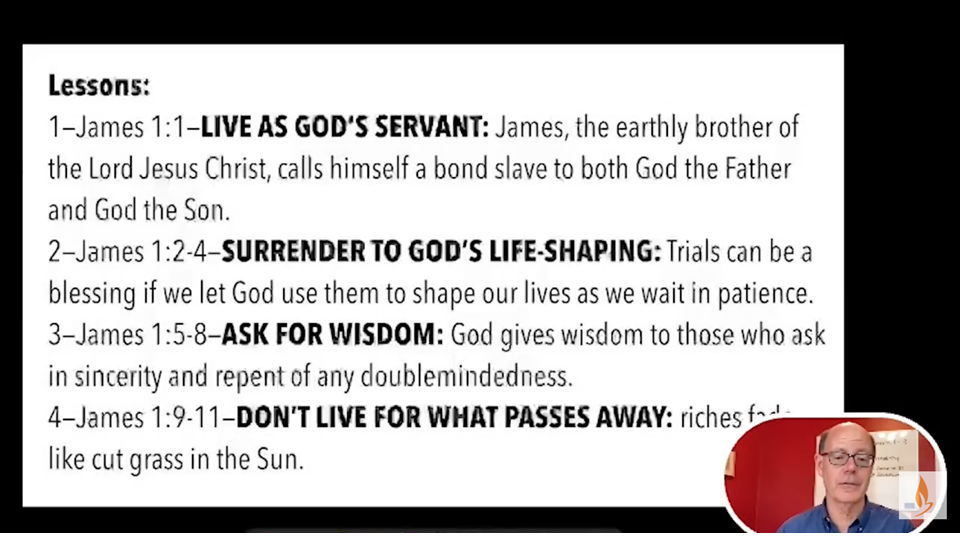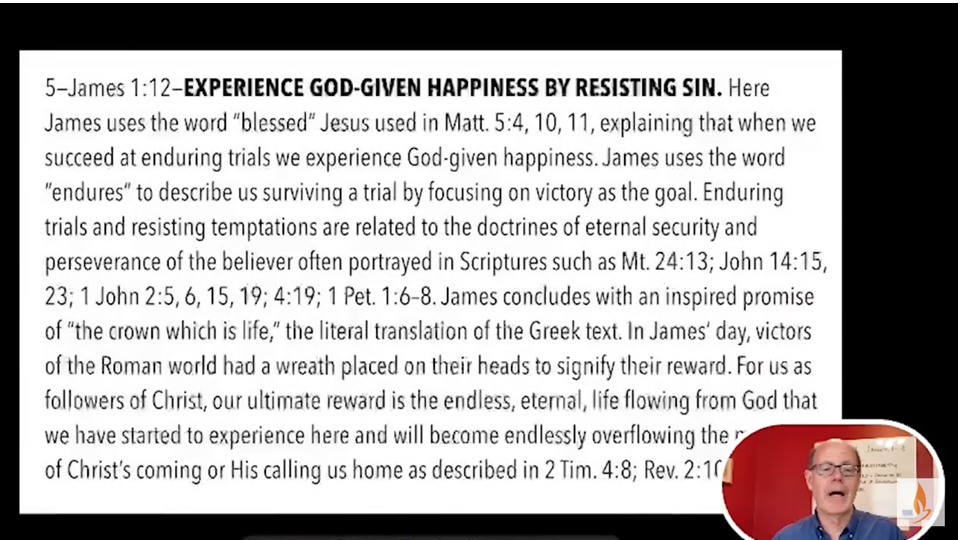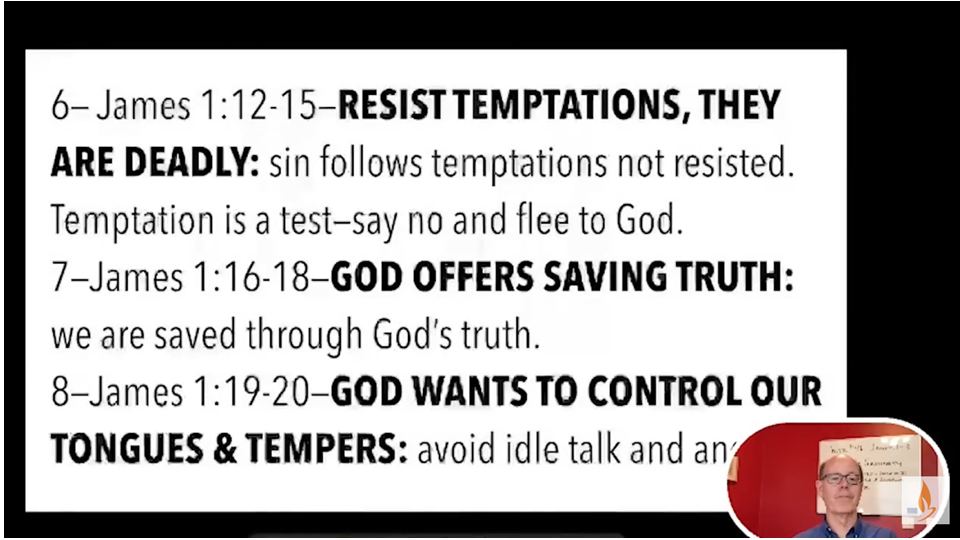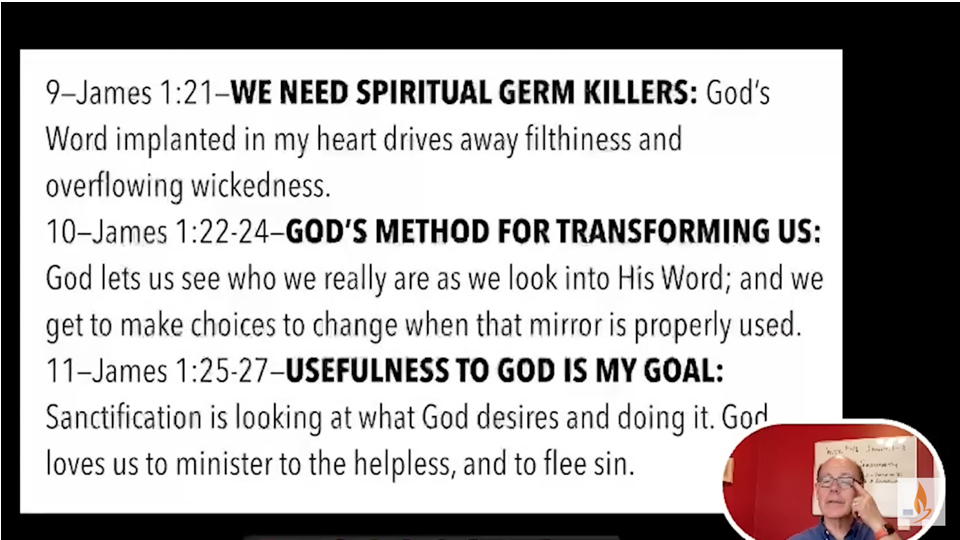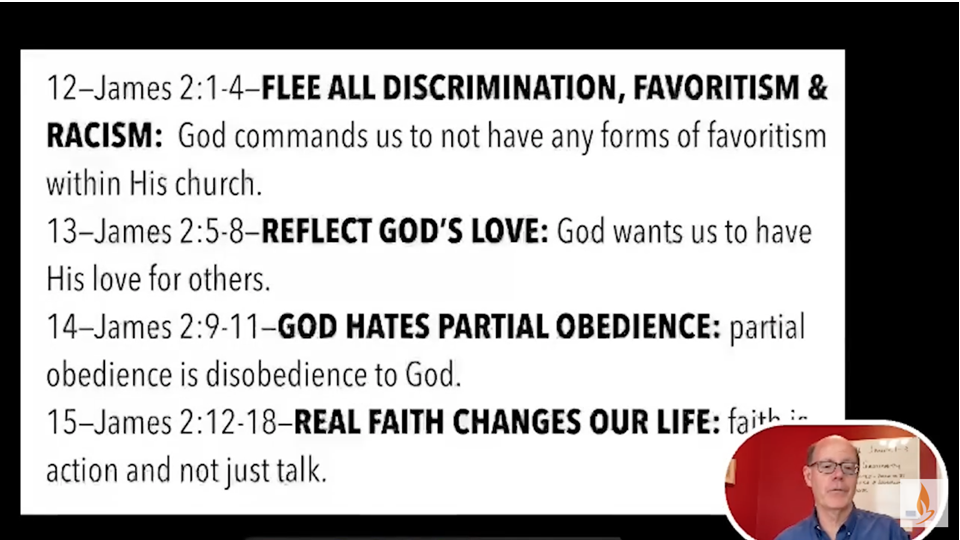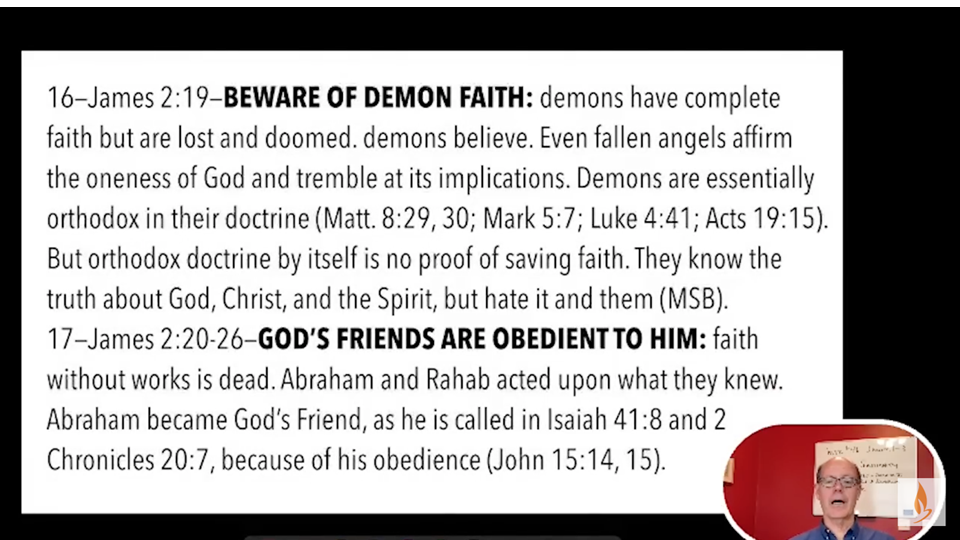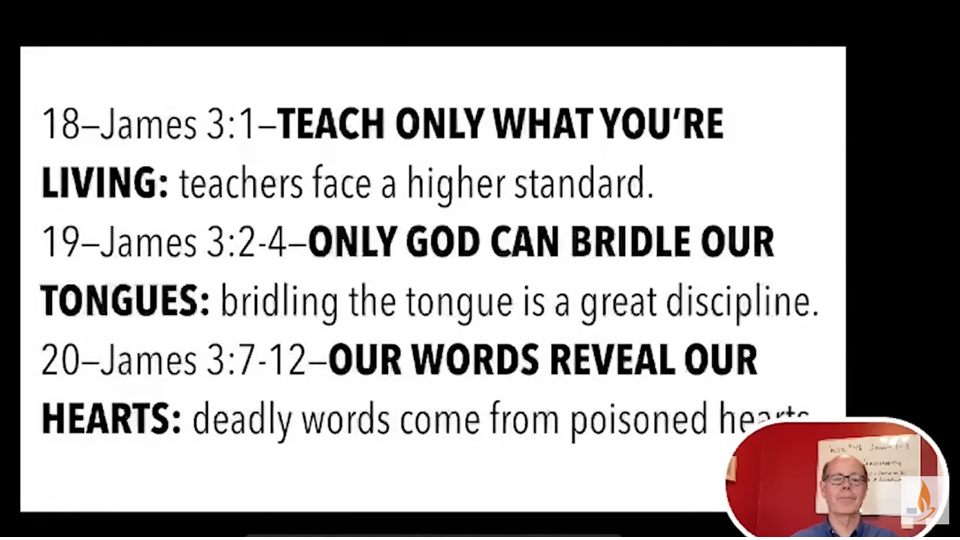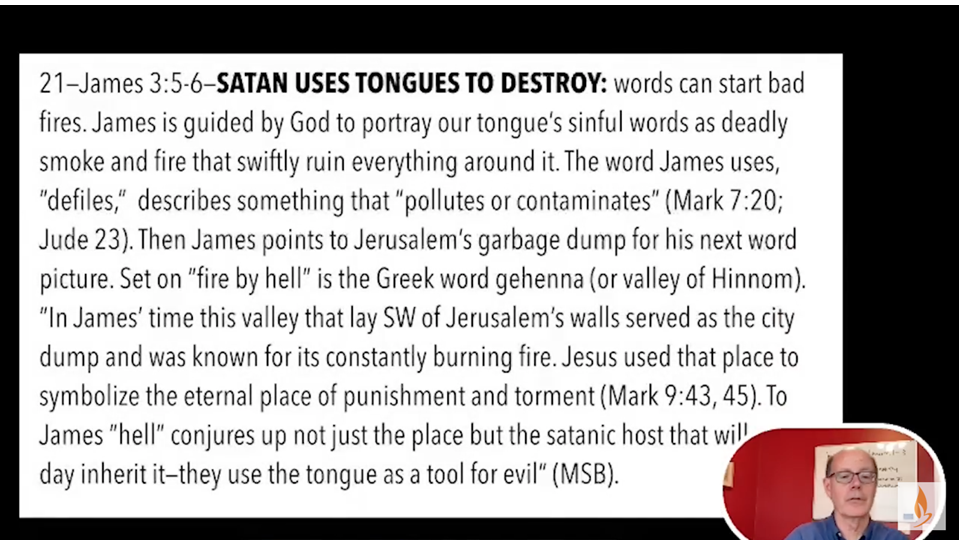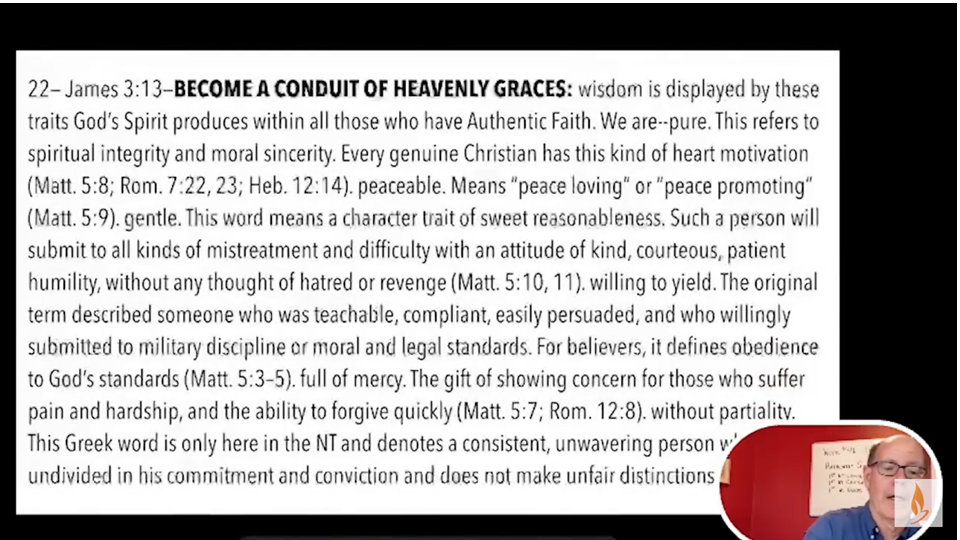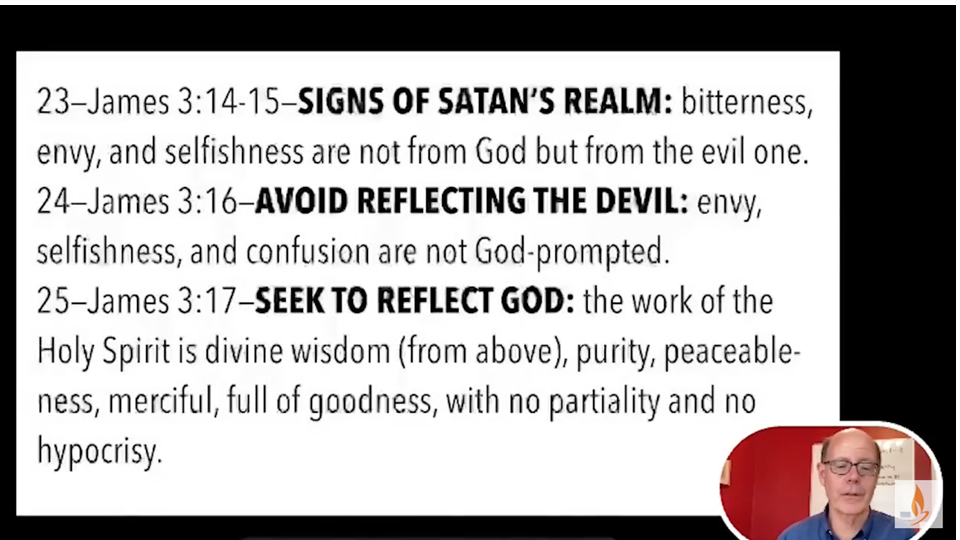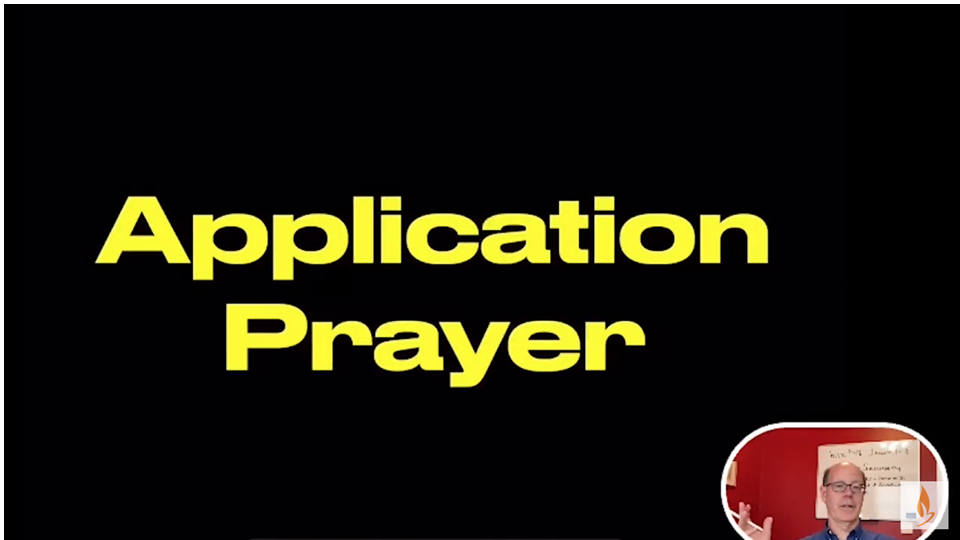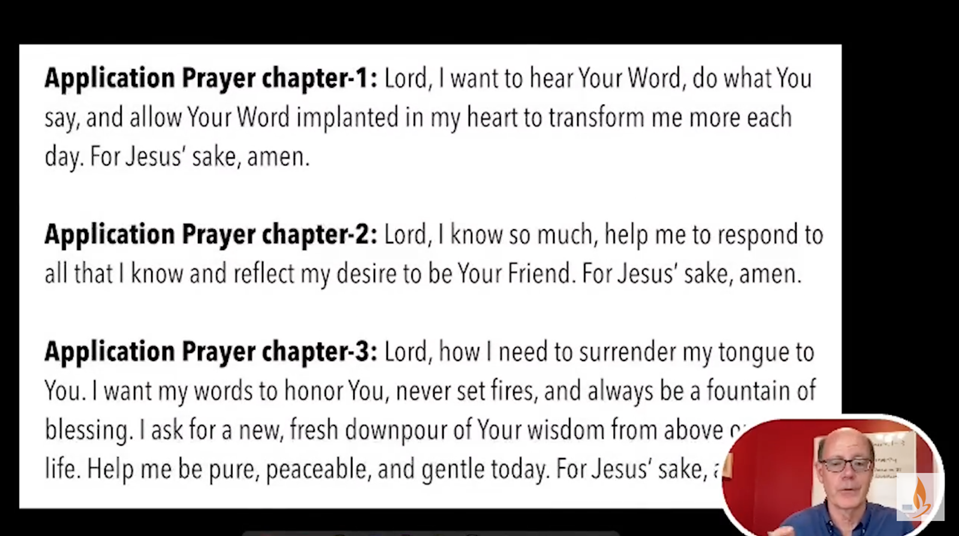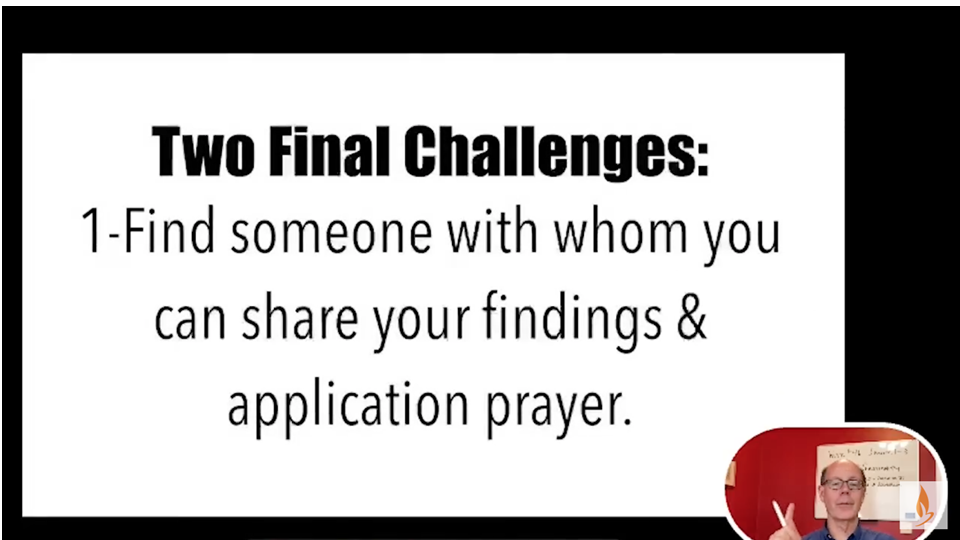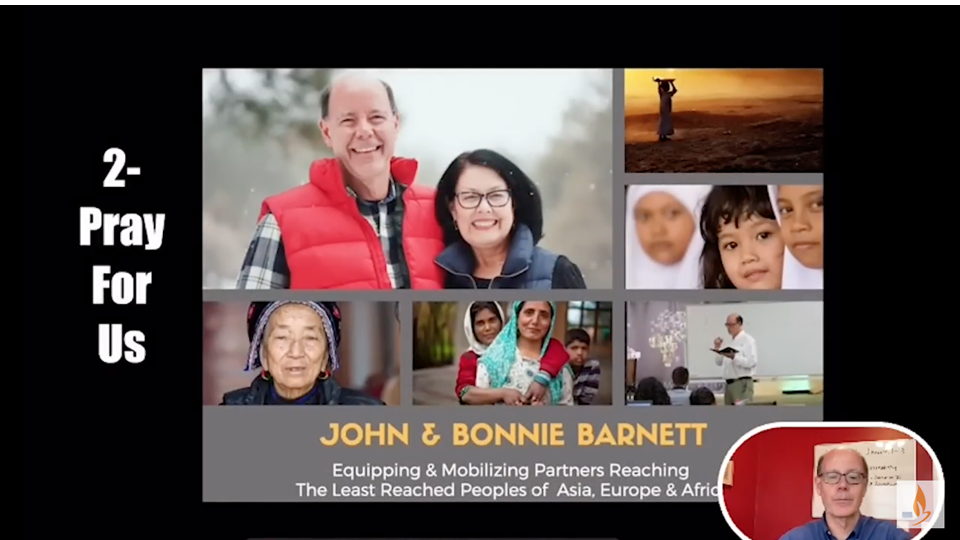If the YouTube video above is not available, here are two other ways to view:
FTGC-46
220607AM
Slides
Transcript
FTGC-46 – Authentic Christianity – If You Believe Right, You Behave Right – James 1-3
Welcome to week 46. We’ve got to the 46th week of our year-long study of the scriptures. You can tell by this background that we’re not at home, we’re not in our studio. I don’t have my whiteboards. We have this temporary whiteboard behind me that I know you can’t see very well. I’m going to concentrate on the slides as we go through.
Get your Bible and in our journey right here, we’re in James 1 through 3. On the screen I want you to notice I’m actually teaching, there’s my Bible right there, look, the same Bible, on the Southern steps in Jerusalem. This is the theme of the book of James that we’re going to investigate as we do our study.
Remember, I’m sitting on one side of the table and you’re on the other side and we’re at Starbucks or Panera or in your small group, Bonnie and I. Wonderful Bonnie is over there sitting, recording this, helping me right now. Recently we got to go and visit a small group that’s doing this study with us, playing them at home on their computers individually, and then gathering as a group and sitting around discussing. It helped me to think about looking into that camera and looking at you as you’re doing this study.
We’re right here in week 46. We’re going to see three different themes, one for each chapter. Faith in chapter 1, temptation in chapter 2, and the tongue in chapter 3. Remember what we’re doing. We’re surveying the whole Bible. We’re using these 52 Greatest Chapters or passages. For me, after I’ve read through the scripture repeatedly, I picked out the group of chapters that would help me to explain the whole Bible if we covered one a week, so that’s what I’m doing with you.
For you in your journal you write down a title. Let me find, here’s my journal over here that I have just like you. I write down just like you, let me get to a page. I write the title and a summary and all the lessons and then the prayer down here. Look at the screen. First, you title each chapter. Then you find as many lessons, truths, and doctrines as you can. Also, as I always encourage you, use some resources like the MacArthur Study Bible which I’m doing, I’ll reach right over here.
You can take this when we’re on the road, like Bonnie and I are as we’re finishing up what’s going to be 13 weeks of travel and we’re in the last few days of it. We should be home, Lord willing, on Saturday and this is Tuesday. I carry on my cell phone, the MacArthur study Bible. I have my journal and my resource, the study Bible, and then my paper copy of the Bible that you can see here. I spend time marking, underlining, and doing these lessons. I look for many lessons and truths and doctrines. Then after I record all those in my journal I write a prayer, an application prayer, that invites the Lord to take these truths that I found in His word and apply them in my life. I’ll do all that with you right now.
First of all, the summary of James’ epistle and this is what you can’t see behind me. It was so sweet. Someone helped me put this board up behind me, but that’s my cell phone there in front of me, that’s a camera. Then my iPad is right here down on the table in front of me. Some of you wonder how we do this. It’s very hilarious. If you could see us trying to get all this to fit together and cords running everywhere in this borrowed home.
Number one, God sent the book of James as the inspired connection between the Old and New Testaments. The first thing I’m trying to show you is right here in my Bible this is the Old Testament. This is the New Testament. See, 1/4th of the Bible is the New Testament, and ¾’s of it’s the Old Testament. Look at this. Here’s the Old Testament, here’s the New Testament. What epistle bridges them? What’s the first epistle that God chose to send to us, written down, to us, His Church? Right there on the slides. God sent the book of James as the inspired connection. It’s the first written New Testament epistle.
I’ll explain that in a chart in just a minute because some of you are saying, wait a minute, in my Bible it’s Matthew. Yeah. That’s the order of the Bible, the canon of scriptures, that we have, and the way it’s been printed since we started distributing Bibles right after the end of the Apostolic Period. We’re looking today at what the order is that these books arrived to us, that God sent them. The first New Testament epistle written was James. God gives us James as the first New Testament epistle. God presents to us in this book James as the first pastor of the first church, which is in Jerusalem. that’s what’s so fascinating.
Just a note for those of you that are going through the 52 Greatest Chapters Study, we’re on week 46 and you’re wondering in four weeks or six weeks I’m going to be done. Let me encourage you to do another year-long study. We have a 52 week long in depth journey through the four Gospels and we do that actually in the Holy Land, the classroom, and the Holy Land and in it’s called The Land of the Book Video Study Tour. You can find that right down in the description of this video. Most videos have it and there’s a little link where you can go and watch a clip of this class.
It’s structured similarly, we mark our Bibles. Like this spot where I’m teaching right now on the slide is these steps, this is the Southern steps. In the lesson on the Southern steps, one of the 52 sites we study in Israel, we learned that the Church was most likely born on Pentecost here on these, the Southern steps. If you don’t have plans for your next study, you ought to consider going to the Holy Land with Bonnie, and with me, and with your journal that you mark each week studying each of the key events in the Gospels. We study them on a map. I have a map down in our studio. We study them in our journals. We use archeology books and our study Bible. That’s an added thought as we’re finishing up this 52 week study.
Right here is the temple of Christ’s time where I’m standing. By the way, this is a model out of a study Bible. This square is the Temple Mount. It’s 40 acres. Here is the temple itself. Right here down in this corner, these are the main entry stairs. Those are called the Southern Steps and that’s the day of Pentecost, the Holy Spirit came, the Church was born, and Peter preached that sermon. Probably down in this area, there are a lot of these Jewish baptismal or mikvah they’re called. The 3000 that were saved on Pentecost were probably baptized in these mikvah down here. That’s just a little backdrop.
This is Jerusalem, look at this, around 63 AD. James, who wrote the epistle of James, is killed in 62 AD. He’s a martyr. Church history tells us they flung him over the walls of the courtyard of the temple and he was killed horrifically, but that isn’t what is so important. The fact that at the time when this event occurred, when James was martyred, here’s the Temple Mount right here. There are the Southern Steps. This is the upper city, Mount Zion. This is where all the wealthy people lived. Then all of this surrounding area is where everybody else lived and this is where the church at Jerusalem met.
Most likely the church met in small groups all over the city. Then collected, as they were accustomed to, up here on the Southern Steps and in the colonnade of Solomon’s porch and up here on the Temple Mount platform. That’s what Jerusalem looked like in archeological maps. Here’s another view. Again, the Southern steps, Temple Mount platform, and this area is where the city of Jerusalem was. Just several things. This is where the wisemen came to Herod’s palace. This is also where Jesus was tried before Herod. Here’s the pool of Siloam. Just to show you a few things. This is the Mount of Olives, Kidron valley is here, and the Hinnom Valley is there. The crucifixion site of Christ is right there. All of those things were constantly surrounding them.
Think about it. When you’re reading the book of James you’re reading a letter to a group of people, from a church in Jerusalem, that was surrounded by all of these sites that I’m showing you on the maps. That’s why the letter that James writes, the epistle of James to the 12 tribes scattered abroad, the backdrop is Jerusalem and that should always be on our minds.
People that came to church, if they gathered here on the temple steps or in the courtyard, while they were looking off in the distance, they could see Gethsemane where Jesus was praying and arrested, the Mount of Olives where He ascended to Heaven, down here the Pool of Siloam where He did all those miracles. Think of that. Going to church, if they were walking up this way to church, they would’ve walked by the Pool of Siloam. These people lived in what we call the world of the Bible. The church of James looked much like this. Jesus was crucified and buried here or here, there are two sites. This has the Church of the Holy Sepulchre, and this is called the Garden Tomb. We cover all that, of course, in our Holy Land study tour.
Here we are standing. This is the whole group and there’s my wonderful wife Bonnie standing right next to me, right there. We’re on the Southern Steps. These monumental steps were carved right into the bedrock by King Herod. You can see the Mount of Olives right here, and these are the present day walls of Jerusalem. Above and behind these walls is what we call the Temple Mount. It’s all blocked off now, all the entrances that would’ve been used in this time. This is where we remember the birthplace of Christ’s Church and what the setting was of the epistle of James.
Where does James fit in the book of Acts? Take your Bible with me, and I’m going to get to James with you. I’m going to show you where the book of James fits in Acts. It’s somewhere after Acts chapter 12. If you get your Bible and mark this, you’ll never be able to read Acts again, without thinking about the context of what’s going on. Here we are on the slide. Here are Acts 1 and this chart has who the Roman emperor was, who the Roman governor was, the approximate date AD, and what the key events are.
This chart is from another course that we teach. We have a Life and Letters of Paul course. That’s another thing you might think about. If you finish the 52 Greatest Chapters you might want to do the Gospels with us. It’s 52 weeks through the Gospels, or this course that I’m currently teaching right now. This is May and in September, October, and November Bonnie and I are going to be overseas teaching the Life and Letters of Paul and we’re using the book of Acts. This chart is right from that course that I’ll be teaching.
Acts 1, Tiberius is the emperor. The prefect is Pilate, like Pilate in the Bible. AD 30 and it’s just after the crucifixion, death, burial, and resurrection of Christ. Jesus ascends after the 40 days that He is alive and with His saints and disciples. That’s what Acts chapter 1 is about. Jesus ascends back to Heaven from the Mount of Olives. Chapter 2 is the day of Pentecost and then chapter 3, remember the lame man healed at the gate? Beautiful. Then chapter 4 Peter and John are arrested. We’re still somewhere in AD 30. Then Ananias and Sapphira. Some time has gone by. They lie, the Lord strikes, and the apostles are jailed and freed by an angel.
In Acts 6, the seven helpers, they’re called deacons. They’re not the same kind of deacons as 1 Timothy 3, but they’re helpers to the apostles. Remember Steven’s accused. He gives his sermon. Paul stands by as he’s martyred in chapter 7. Again, we’re still in this period where Pilate is the prefect. Then Saul starts his persecution. Phillip takes the Gospel to Samaria. Ethiopian convert. Now, it’s AD 33. Most scholars believe that.
If you look in your MacArthur Study Bible, I have my electronic copy here. If you look, you’ll see a lot of this chronology I’m showing you. I follow the chronology of the MacArthur Study Bible. When you look in those footnotes, they’re mirroring. It’ll say the prefect is Pilate, the emperor is Tiberius. About the year AD 33, Paul is converted, and goes off to Arabia where he is taught by the Lord.
Look, we have a new emperor in Acts chapter 10. Caligula is a new emperor while Paul’s off during that time in Arabia on the backside of the desert. We get a new prefect. Peter goes to Joppa and Paul has finished his training with Christ and he goes to Tarsus. From when Paul was converted and escaped from Damascus and from there until he goes to Antioch it is almost 10 years. You see that the period down here, the dates are going to be going up. Claudius became a new emperor in 41. Paul is serving in Antioch. Remember Barnabas is ministering to him.
Look at chapter 12 and that’s where I am in my Bible. Grab your Bible and look at Acts chapter 12. It says, in verse 1, Acts 12:1. “Now about that time Herod the king.” Look at your chart. Hared Agrippa is the king until 44. He’s going to die in chapter 12, so this is sometime around the year 44. He “stretched out his hand to harass some from the church. Then he killed James the brother of John.” This is not James the one who’s writing the epistle, James. This is the Apostle James, James, and John the sons of thunder. The first apostle martyred is James and he is killed by Herod. He goes to, verse 3, seize Peter during the Feast of Unleavened Bread. He arrested him and he was going to bring him to the people after Passover.
Of course, you know the story. The angel has to wake up Peter. He’s being guarded by 16 soldiers, and he is released from his chains. The angel walks him out through the city. The gates open and he goes to Rhoda, and she hears his voice, verse 14, because we’re glad that she doesn’t open the door and all of that. We study all that in our journey through the book of Acts. Why I’m saying that is because now look at the book of James. James chapter 1 because I want you to see the background, the context of the epistle we’re studying today.
“James, a bondservant of God and of the Lord Jesus Christ, To the 12 tribes which are scattered abroad.” Why were they scattered? They’re arresting the apostles. They’re killing the apostles. Even though Paul had caused some persecution this is government level persecution. Herod the king is martyring the leaders of the church, so people scatter. Back to our chart here. The persecution of Jerusalem, look at this, prompts James, right here somewhere after chapter 12, to write his epistle. Look at what’s going on in the same period; Paul’s first missionary. That’s what happens in 13. Okay.
Do you remember where the people saved at Pentecost came from? Because when Jerusalem had this persecution that we’re thinking about now, if you were driven out of Jerusalem, where would you go? Some people had friends from Pamphylia, some had friends in Phrygia, Asia. Others would go to Crete, Cyrene, Egypt. See, they would go where other believers were that were Jews. This is where all the Jews were from the day of Pentecost. See this. Isn’t that amazing? Even Rome. From the persecution of Acts 12, people started going back to where all these Day of Pentecost people had come from. They escaped persecution.
Look at this. James is writing to them because they formally had been in his congregation. Listen, the perspective of the book of James is nothing about Gentile churches. It’s totally Jewish. That’s why, look down here in the chart, Galatians comes around in 49 AD after James is written. What happens in between? The Jerusalem Council. That’s Acts chapter 15 right here, and you can read that. That’s where the church in Jerusalem is hearing about the massive growth of churches all over the Roman world. The people in Jerusalem are saying, how do we fit us, we’re the true Church, we’re in Jerusalem, Jesus was here, with all of them?
James steps forward as the first pastor of the first church in Jerusalem. He writes the first New Testament epistle before Paul writes his and it explains salvation bridging the Old Testament to the New. Then at the Jerusalem Council, he says there is a Gentile church and we don’t lay on them, they don’t have the yolk of the law put on their heads. They’re supposed to still obey God and keep His commandments, but not the Jewish ceremonial law and all the purifications and all the feasts and the circumcision and the sacrifices. None of that was to be laid on the Gentiles. That’s the context. Paul is by now in his second missionary journey traveling here through Philippi, Thessalonica, Berea, and Athens and you remember all that. Okay.
Here’s the Roman world. Right here is Jerusalem on the map, see over here in the corner. The people are scattered out from Jerusalem’s persecution in chapter 12 and James writes his epistle, look at verse 1, “To the 12 tribes which are scattered abroad.” That’s the context for the book of James.
Here are just some points. James is the Hebrew word Ya’akov, lakobos in Greek. In English, we call him Jacob or James. He’s the earthly half-brother of Jesus. Remember Matthew 13, Mark 6. Paul also says that in Galatians. He was an unbeliever during the life of Christ. He became a believer sometime around the cross because Jesus came to visit him. We know, Paul says, that he was married because he had a wife that he took around with him. He became the first pastor of the church in Jerusalem. We see that in the book of Acts.
Some more truths about him. When Peter’s released from prison in Acts 12, who does he tell the saints to inform? The pastor of the first church, he’s the leader. James summarizes the Jerusalem Council. He proclaims Gentile Christianity and Paul reports to James when he gets back from his missionary journeys. James’ name is used by the Judaizers. There’s so much about James in the scriptures. By the way, all that I’m sharing with you, you can read the study notes of your MacArthur study Bible and you’ll see all this.
You say, what is the purpose this week? The purpose this week is for you to get a clear picture of the context of the book of James, then looking and sifting through the verses of this beautiful epistle. By the way, there are 108 verses in James. That was the first entire book of the Bible I ever memorized.
When I was in college, I went to Bible college. They limited our time because of water shortages, and we could only take a five minute shower. I timed myself using a stopwatch. I could say the whole book of James in five minutes if I quoted it like this: “James, a bondservant of God and of the Lord, Jesus Christ, To the 12 tribes which are scattered abroad: Greetings. My brethren, count it all joy when you fall into various trials.” I would stay in the shower quoting as fast as I could and when I got done, I knew my five minutes were up. James is an incredible epistle whether you’re quoting it, memorizing it, or like we’re doing with our journals, meditating on the truths.
Let’s get further into it. The epistle of James has seven parts to it, and I’ll get all seven of them up here. Whoop, back up. I’ll get all seven of them. Whoop. Sorry. I hit too many buttons here. Let me get through. We’ve already covered all that. I won’t hit it so fast. There we go. Part one, faith endures. Part two, faith responds to God’s word. There we go. Don’t turn. Here we go. Faith endures, that’s chapter 1 the first half. Faith responds to God’s word right here. Remember you look at it, look into the glass, and change in the same image as Paul talks about. You reject discrimination. You don’t have respected persons. No racism, no class warfare. Authentic faith produces good works, faith without works is dead, chapter 2:14-26. We exercise self-control. Remember that? We have the wisdom that is from above. We resist worldliness. Remember, don’t love the world or the things in the world as John says, but here it says that whoever’s a friend of the world is an enemy of God. Then faith resorts to prayer in everything and this whole last section is about prayer. These are the seven key divisions of the book of James.
James is very practical. Of the 108 verses there are 54 imperatives or commands about how to endure, how to respond, how to reject discrimination, how to produce good works by surrendering to the Spirit, how to exercise self-control and resist the world, and constantly pray without ceasing, as Paul said. Okay.
This is my Bible that I’ve worked on all week long with you and I’ve taken notes on each chapter, just like you. I did one chapter per page and then when I got done with all that I typed out for you, my journal. It’s very hard, especially with the way we only have one camera, for you to see what I’ve written in my Bible, so I typed it up for you.
Here we go, number one in my journal. This is a close up if you could get the camera close enough to my journal, you’d see this: at the top of the page, I put 52 Greatest Chapters, week 46, James 1 to 3. I wrote a title for chapter 1, Authentic Christianity. Chapter 2, Favoritism and Dead Faith in the Church. Chapter 3, The Tongue Reflects Divine Wisdom or Demons.
Remember every time I read it, I elaborate more on my title. That’s the first run through. Okay. You’ll have a lot more notes than mine, but that’s just my quick title. I write those in my Bible right here at the top of each chapter. My goal is to have every chapter of the Bible titled, every lesson of every chapter of the Bible found, and an application prayer from every one of those chapters that I’ve studied. That’s my goal. For you, I’m doing 52 of them, but personally, I have done the whole Bible that way. I hope you’ll finish the course and get all 52 of these weeks done, but I can’t tell you enough how life changing it is to be able to look at any chapter of the Bible and to see where the Lord convicted me about that attitude or that direction in my life, or a kind of action that was wrong.
Bonnie, you reminded me. While driving one time Bonnie says, honey, there’s a car in front of you driving too slow, slow down. I said, okay, and so for about three or four minutes, we crept down this residential street with this car kind of stopping every four or five feet. A lot of cars started building up behind us. They all started honking at me. Then one of them comes and swings around and tries to go around me on this little narrow street. Finally, I look behind me, I look around me, and I decide I’m going to pass this car. I start passing him and he immediately turns on his siren. It was an unmarked police car. I’m not sure if he was trying to see how long we would be patient. He puts on his little siren and lights, and I pull over to the side and I hand him my license. He said, are you in some big hurry? Is the house burning down or something? I said, no, sir. He said, are you late for an appointment? I said, no, sir, I’m sorry and I handed him my license. He said registration so I handed him the registration. He stood there for a second and he looked in the car and it was so sweet I could tell that Bonnie was praying. Then he handed back into the window my license and registration. He said don’t do that again. I thought Bonnie always tells me don’t be impatient, honey, just wait. When people drive crazy just slow down.
Do you know what? That was a great lesson to learn. I was studying the book of James with you. Do you know what James says? Let patience have its perfect work in you. I’ll tell you what, if you do, you won’t have any unmarked police car pull you over. Thankfully, I didn’t get a ticket, but it still was a great lesson. Let patience, like we’re going to see in this chapter, have its perfect work in you. Okay.
Here’s a summary. This is what I wrote and typed out for you. This is of all three chapters. Do you want to grow in your spiritual life? James takes us to the heart of the life we’re to live in Christ. Here’s a summary of the topics he teaches about. Remember, as I’m writing this down, I’m always remembering that this is an inspired book. This is God speaking through His Spirit. This is the very word of God. Here’s what God says. Number one, God wants us to confess our sins. He wants us to pray. He wants us to use wealth, He shows the right and wrong usage. He explains temptation, swearing, murmuring, patience, judging, submission to God, worldliness, the origin of strife, riches versus poverty, wisdom, joy, and trials, heavenly versus earthly wisdom, our tongue, teachers, faith, works, justification, God’s law, liberty, partially true religion, and regeneration. That’s my quick list from my journal. It’s a huge study this week.
Let’s get to the lessons. Number one, see what I’m doing, I have marked these. You can see they’re underlined, and I write little notes around them, you’ve always seen that while we do that, to remind myself. Number one, the first lesson I learned is God wants us to live as God’s servants. James was the earthly brother of the Lord Jesus, but he calls himself a bond slave, both to God the Father and God the Son.
If I was James, I would’ve hinted that I was the brother of Jesus. Right? That’s how we think. No. The Church historian Eusebius tells us something about when they buried James after he was martyred in 62. The Jews washed the body then put spices on them. They didn’t do it just to Jesus, that’s how they buried people. When they were washing him, do you know what they discovered? His knees, the historians say, were like camel’s knees. Have you ever seen a camel and how rough and hard those knees are, and worn? What’s the significance of that? James, who coasted through life saying I’m Jesus’ brother, I’m the oldest of His earthly brothers. No, look what he said. I’m a servant. Literally doulos, a slave of God the Father and God the Son, Jesus Christ. Do you know what James spent a lot of his life doing? Being on his knees before his brother Jesus in prayer. Do you want to know what God wants from us? He wants us to be His servants and to be given to prayer.
Number two, verses 2-4. Now see in your Bible, “Count it all joy when you fall into various trials, knowing that the testing of your faith produces patience. But let patience have its perfect work” in you so you don’t pass unmarked police cars, right? Or anything else in life where we’re in a hurry. Impatience leads to all kinds of things we regret. What’s this? Surrender to God’s shaping of our lives. Trials can be a blessing if we let God use them to shape us while we wait in patience.
Number three, verse 5, ask for wisdom. See what it says here. “If any of you lacks wisdom, let him ask of God.” Look at verse 9. Don’t live for what passes away: riches fade like cut grass in the sun. “Let the lowly brother glory in his exaltation, but the rich in his humiliation…For no sooner has the sun risen,” but the flower fails. That whole passage is about the temporal nature of earthly things and God says to live for what is eternal.
I love this, look at verse 12 and I spent a long time on this. This is a little example of how we use the study Bible. “Blessed is the man who endures temptation,” verse 12, “for when he has been approved, he will receive the crown of life.” Look at this. This is my copying over and writing around a study note that I got off of my MacArthur study Bible.
James uses the word blessed. Jesus uses the same word. One of the characteristics of James is that he uses material from the Sermon on the Mount, about 20 references to the Sermon on the Mount. Here are three of them. First, explain that when we succeed in enduring trials, look at this, we experience God given happiness. Do you want a blast of supernatural joy? Then ask God for patience and endurance at work, at school, in your home with your family, with your parents, with your marriage partner, with your boss. Endure trials at church in your ministry, on your mission field, whatever you’re doing. When you say Lord, I want your grace to persist and not give up and not respond incorrectly, you get this blast of grace. He calls it blessedness. “Blessed is the man who endures temptation.” It’s God given happiness. James uses the word endures. This is another word study you can get in your study Bible. James uses it to describe surviving a trial by focusing on the victory. This is often portrayed in scripture; you can see all that.
Look at this, here’s a note on the crown of life. The crown which is life, that’s the literal translation of the Greek text. Some of you say, oh, I don’t know Greek. You don’t need to know Greek. All you need is a Bible that helps you understand the impact of the Greek, use a study Bible. That’s where I grab my MacArthur study Bible and I look for all of his word studies. Here’s one of them. This crown of life in James’s day, victors of the Roman world had a wreath placed on their heads signifying the reward. For us as followers of Christ, our ultimate reward is the endless, eternal life flowing from God that we have started to experience here. See that’s what I mean about when we believe what the Bible says and we say, Lord, I want patience, Your overflowing patience, Your Spirit to fill me. We get this surge of feeling, look at this, the endless life that’s flowing endlessly from God. We’re already experiencing a portion of what we’re going to have limitlessly in Heaven. Wow.
Verses 12-15 are great. It’s part of a three, actually from 12, 13, 14, 15, and 4 verses which talk about resisting temptations because they’re deadly. Sin follows temptations not resisted, so it says the dangers. Then, look at what God says in verse 16 and it’s hard not to just teach through every word of this. “Do not be deceived, my beloved brethren. Every good gift…is from above.” Look at verse 18, “Of His own will He brought us forth by the word of truth.” Look at this. God offers saving truth. See, these bold caps are the lessons I wrote in my journal and my Bible. My sixth one is to resist temptation, they are deadly. My seventh one is God offers saving truth. See that in verse 18? “He brought us forth by the word of truth.” This is God’s written truth. When I believe it, it’s just unleashed into my life.
Then verse 19, God wants to control our tongues and our tempers. “My beloved brethren.” Remember James is teaching a literal group of people in the city of Jerusalem, and they were gathering up on the temple steps. “Let every man be swift to hear.” Remember, you have two ears and only one mouth. You can hear that pastoral heart. It says, “for the wrath of man,” verse 20, “does not produce the righteousness of God.” Avoid idle talk and anger.
My ninth lesson is that we all need spiritual germ killers. Do you remember all the wipes and hand cleaners that we resisted COVID with? Do you remember all that? We have spiritual germ killers. God’s word is implanted in my heart, listen to this, see what I wrote. It drives away filthiness and overflowing wickedness. See verse 21. “Therefore lay aside all filthiness and overflow of wickedness, and receive with meekness the implanted word, which is able to save your souls.” That word sōzō, cleanses, washes, renews, regenerates. God’s social germ killer is receiving the word and implanting it, it starts at salvation, but it doesn’t end, it continues on all of our life.
Then God’s method for transforming us is in verse 22, “be doers of the word, and not hearers only.” The danger is we know more than we’re doing. We’ve heard it. Most people miss Heaven by 18 inches. They’ve heard it. They’ve never repented and believed and embraced Christ. The same is true in those who are lethargic and who have not taken the truth and said Lord, I want to apply it. That’s what we’re going to do in just a minute with our application prayers. Then, usefulness to God is my goal. That’s the 11th lesson I found.
Now we’re into chapter 2, flee all discrimination, favoritism, and racism. Look what it says in chapter 2. “Do not hold the faith of our Lord Jesus Christ, the Lord of glory, with partiality.” It talks about someone with a gold ring in fine apparel and a poor person in rhyparos, that’s the Greek word, rhyparos. Do you know what that word means? Smelly. It’s a person who sleeps in their clothes, a person who doesn’t bathe, a person who goes days with no cleansing. If one of those came into the church and someone else came in their fancy, expensive, jewelry laden outfit, the natural human tendency is to put the glitzy one up front at the best seat and to put the smelly one out back where they won’t bother anybody.
Do you know what the Lord says? That is respect of persons. “You pay attention,” verse 3 of chapter 2, “to the one wearing the fine clothes and say to him, ‘You sit here in a good place,’ and say to the poor man, ‘You stand there,’ or ‘Sit here at my footstool,’ have you have not shown partiality among yourselves, and become judges with evil thoughts?” Flee discrimination, favoritism, and racism.
Secondly, reflect God’s love. Look at verse 5. “Listen, my beloved brethren: Has God not chosen the poor of this world to be rich in faith.” He says to reflect God’s love. Don’t be like the world where you’re trying to favor those who you think will enrich you with their kindness if you show special attention to them. No. No. God says to do things for those who can never repay it. Remember, Jesus said in the New Testament Gospels that’s who we invite to our feasts, those who can never invite you back.
God hates partial obedience in verses 9 through 11 and real faith changes our life. Look at verse 12. “So speak and so do as those who will be judged by the law of Liberty.” All the way down through verse 18. If someone says “‘You have faith, and I have works.’ Show me your faith without your works and I will show you my faith by my works.” Here’s the lesson. Real faith is life changing faith. Real faith changes you. Do you see I’m finding all these lessons? This is an application prayer: Lord, I want to flee discrimination. We live in a world with so much racism and favoritism. I want to be someone reflecting Your love. I want people to notice in the way I drive, by patient driving, by the way I talk to people, and by the way I treat people. I want them to see a mirror reflecting God’s love. See, that’s what we’re called to do.
That’s how the early church turned the world upside down. That’s what Acts 11 says. They’re called little Christs. Have you ever heard the word Christians? Of course we have. Did you know that was a disparaging term in Acts 11? That’s what the people in Antioch called all these followers of Christ. They’re all just little Christ’s. They’re all acting like Him. What a compliment. What a prayer request. Lord, I want to flee discrimination, favoritism, and racism. I want to reflect Your love. I don’t want to partially obey. God hates partial obedience. That’s when you obey when you’re being seen, not when you’re not seen. When you think I’m an exception to the rule; it applies to everybody else, but not to me. Real faith changes our lives. Okay.
Chapter 2 verse 19, beware of demon faith. Here are some study notes from the study Bible. I took notes from it. Demons have complete faith but are lost and doomed. Demons believe. Even fallen angels affirm the oneness of God. They tremble. Demons are orthodox in their doctrine, but orthodox doctrine is no proof of saving faith. They know the truth about God, Christ, and the Spirit, but they hate it, and they hate them. That’s from the MacArthur study Bible. This is my lesson, beware of demon faith, beware of being afraid of God without wanting to submit and bow and obey Him.
Number 17, see right there, that was lesson 16 and this is lesson 17. James 20 to 26. As I was reading along it says, “Do you want to know, O foolish man, that faith without works is dead? Was not Abraham our father justified by works?” Look at what I wrote: after reading James 2:20-26, all of God’s friends are obedient to Him. Faith without works is dead. Abraham and Rahab acted on what they knew. Abraham became God’s friend, by the way, that’s what he’s called in Isaiah 41, 2 Chronicles 20, and of course, right here. Do you remember what Jesus said? Jesus said You’re my friends if you do whatever I command you. My application prayer is I want to be God’s friend. I want to go through life with people confusing me as an imitator of God. That’s the goal of our life. Is that the goal of your life?
See how practical James is? 54 imperatives, 50 pastoral admonitions through the Spirit of God, through Christ’s oldest earthly brother from Mary and Joseph, and those children. James was the oldest, the firstborn after Jesus. He is the one that’s speaking, and you know what he says? I want to be God’s friend. Abraham was God’s friend. I want to be God’s friend. You need to be God’s friend. God’s friends are obedient to Him.
Now we get to chapter 3. Teaching only what you’re living is my lesson. This is what it says, “My brethren, let not many of you become teachers, knowing that we shall receive a stricter judgment.” What that’s saying is that we have to be so cautious. When I was in seminary, I was learning so much that I was writing it all down. I was preaching sermons. Do you know what my mentor said? He said, don’t try to live up to your preaching. Don’t feel this burden that oh no, I’ve got to live up to all that this week. No. He said only preach and teach what you’re living. Where’d he get that? James chapter 3 verse 1. Don’t teach it if you’re not willing to embrace it by faith and live it yourself. Only God can bridle our tongues.
For my 19th lesson look at verse 2. What David said in the psalm, set a watch at the door of my mouth that I sin not against you with my tongue. Look at verse 8. Let me turn the page. Look what it says. These are some of the strongest words in James. “But no man can tame the tongue,” verse 8. “It is an unruly evil, full of deadly poison.” Our words reveal our hearts. That’s the lesson that I got.
Remember what I’m doing. I distill down one verse into a phrase, three verses into a phrase, or six verses into a phrase. That’s what I mean by finding an application or a truth or a principle. You look and you sift through all the words of God and verses, and then you summarize something you can hold onto, that you can say, God, I want You to do this in my life. I’m saying, God, I want to only be teaching what I’m living. God, only You can bridle my tongue. Jesus, You said in Your ministry and James repeats it that words reveal our heart. Out of the abundance, Jesus said, of the heart, our mouths speak. That’s what I want. I want God to change my heart so my words are right. Okay.
Here’s the 21st lesson. Satan uses tongues to destroy. Here is another summary and I want you to see the value of getting either an electronic version of the MacArthur Study Bible or the big 4lb heavy one that I have at home when I’m in the studio. Words can start bad fires, James says. James is guided by God to portray our tongue’s sinful words as deadly smoke and fire, ruining everything. The word James uses for defiles is something that pollutes or contaminates, which is the same thing Jesus and Jude said.
By the way, James points, when he says set on fire by Hell, that’s pointing to the garbage dump. Set on fire by Hell is the Greek word Gehenna or literally Valley of Hinnom. In James’s time, the valley that lays Southwest of Jerusalem’s wall was the city dump and it had constantly burning fires. Jesus symbolized the eternal place of punishment in that picture. Hell conjures up not just a place, but the satanic hosts that will inherit it. They’re the ones that want to use my tongue. Satan wants to hijack my tongue and make me exaggerate, minimize sin, repeat gossip, set a fire, disparage someone, destroy, dishonor, speak evil, or whatever, proudly boast. You know what? Since Satan uses tongues to destroy, I want God to control my tongue.
Then, let’s get down to number 22. Lesson 22 is from verse 13. Let me turn to verse 13 with you. “Who is wise and understanding among you? Let him show by good conduct that his works are done in the meekness of wisdom.” Become a conduit of heavenly graces. This is summarizing this whole section. Each of the words where it says in verse 17 “the wisdom that is from above,” look at this, we are pure. Here are the words. This is right out of the MacArthur study Bible. This is spiritual integrity; every genuine Christian has this. We’re to be peaceable, that’s peace loving. Gentle, see in verse 17? Look down at verse 17. “The wisdom that is from above is first pure, then peaceable, gentle.” In the study Bible, you have a little summary, a word study of each of these words. It’s a reflection of what the Greek language says. Gentle, it’s sweet reasonableness, they submit to mistreatment and difficulty, the note says, willing to yield. The original term describes someone teachable. Full of mercy. It’s a gift showing concern for those who suffer without partiality. It’s only here in the New Testament. It’s a consistent, unwavering person who is undivided in his heart, his commitments, and his convictions. He doesn’t make unfair distinctions.
Those are heavenly graces. I’ve memorized this verse. I love this verse. “The wisdom that is from above is first pure, then peaceable, gentle, willing to yield, full of mercy and good fruits…without hypocrisy.” Those things that you see there; pure, peaceable, gentle, willing to yield, full of mercy, without partiality, are like a shower that I say, Lord, shower me with these heavenly graces today. Do you see why it’s so good to apply each section of this book?
Quickly to finish up, the signs of Satan’s realm are bitterness, envy, and selfishness. When we’re bitter, envious, or selfish, God isn’t prompting us, but the evil one is. Good lesson. Avoid reflecting the devil. Envy, selfishness, and confusion are not God prompted. Wow. Seek to reflect God, verse 17. The work of the Holy Spirit is divine wisdom from above which is pure, peaceable, merciful, and full of goodness. Seek to reflect God.
This has been a long lesson. How long are we on honey? 52 minutes. Aren’t you glad she’s over there praying and capturing this and helping me? I want to not wear out our time here at Panera or Starbucks or in your living room. How do we apply all this? I’ve shown you all along, but here are just the quick prayers. I just quickly made one page of them.
From chapter 1 I wrote Lord, I want to hear Your word. I want to do what You say. I want to allow Your word implanted in my heart to transform me more each day. For Jesus’ sake, amen. Look what I bowed and prayed. I wrote pages from chapter 1, and I showed you pages in this study.
Chapter 2, I bowed my head. In fact, with my small group I did this years ago when we used to meet in person before Bonnie and I were missionaries on the field and on our 13th week on this trip. When I was with that small group in Kalamazoo, Michigan I bowed my head and after this lesson, I said Lord, I know so much. Help me to respond to all that I know and reflect my desire to be Your friend. In other words, I want to live all these truths, not just be a hearer, but a doer. For Jesus’ sake, amen.
Then after chapter 3, this is what I wrote. I need to surrender my tongue to You. I want my words to honor You, never to set fires, to always be a fountain of blessing. I ask for a new, fresh downpour of Your wisdom from above. I can just feel it. It’s just like a shower. I say, I want Your wisdom from above that’s pure and peaceable and gentle. I want a fresh downpour of Your wisdom from above on my life. Help me be pure, peaceable, and gentle today. For Jesus’ sake, amen. The method is to title the chapter. You summarize a little bit of the context. I showed you all those pictures in history. You find the lessons and then you apply them to your life.
Now, two parting challenges. Number one, you might have just tuned into this. Maybe you got interested through the prophecy and the teaching through Revelation. That’s what we’re doing, Bonnie and I, on the road right now, ministering to the students. We’ve been teaching the book of Revelation and traveling between Bible institutes and Bible colleges. Maybe you were watching one of the videos and saw this in the feed and you go what’s this? This is a challenge for you.
If you’re a Christian you shouldn’t be a solo Christian, you shouldn’t be a lone ranger, you shouldn’t be an island. You need to get connected with other believers. Do you know what the best way to do that is? Wherever you go to church, find out if they have small groups. Most of them don’t. If they don’t, start one. Say, hey, I’m doing this online 52 Greatest Chapter Study. All you need is your Bible and a notebook and some study tools that you can get, even download. I’m going to do this study. Could I share what I’m finding with you? Look at this, find someone with whom you can share your findings and application prayer.
Bonnie and I, this week, got a note from a family. They live in the middle of England. If you look at a map, it’s the Queen’s Jubilee right now, and you see the island of Britain, the United Kingdom with Scotland and Ireland and all that, but right in the middle of main England, right in the center, they said, look on a map. We live there. We don’t have a local church anywhere in our area that we can drive to. They don’t believe the Bible. They don’t teach the Bible, so we have opened our home. Mom and dad and the kids said we are doing the 52 Greatest Chapter Study as a family, and we’ve started inviting in friends. Wow. I sent them a note. They told me about it on Facebook, so I Facebooked them back and I said, wow, that’s encouraging. God’s word works anywhere. It works when you find someone, and you say let me show you what I’m finding in the word and let me pray this application prayer. Do you know what will happen? People will say, I want to do that too.
Number two, pray for us. My wonderful wife Bonnie, she’s over there running the camera. We are full time missionaries. We alternate work between Asia, Europe, and Africa. We equip and mobilize the next generation and frontline missionaries. This 13 week period, starting this summer, we’re going to be doing American conferences and also in Canada. Then in the fall, starting in September, the United Kingdom, and Italy and Greece and Israel and into east Asia. We’re going to be teaching The Life and Letters of Paul, The Book of Isaiah, and The Book of Proverbs. Pray for us, please, that we will be sharing the Gospel everywhere we go, that the Lord will protect us, and most of all, that God will use us to touch many lives and to get people back into the Bible back, back to studying the Bible, living as little reflections of Christ. Thanks for joining us. Can’t wait till next week, we’re going to be doing 1 Peter and that will be so exciting, but let’s spend this week with your journal and Bible in James 1, 2, and 3. God, bless you. See you next week.

